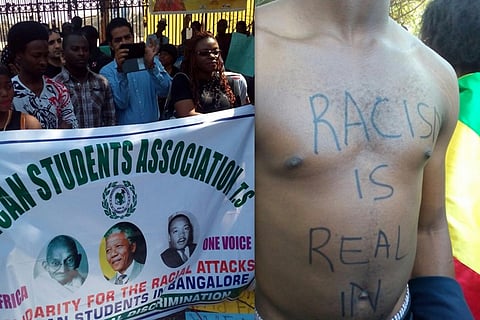

Days after a Congolese national was beaten to death in the national capital and a Nigerian student was assaulted in Hyderabad, the Indian government is in damage control mode, lest the country be branded as racist. While MoS General VK Singh chose to blame the media for “blowing up a minor scuffle”, External Affairs Minister Sushma Swaraj said, “India is the land of Gandhi and Buddha... We can never have a racist mindset.”
But discrimination and bigotry only attract headlines when they reach a threshold of violence. For many Africans in the country, their everyday lives are laced with less visible but painful racist encounters.
Racial slurs and stereotypes
''People call us names like ‘blacky’, ‘blackberry’ and even ‘monkey’. It happens on the road while driving, at public places and even at the locality we live in,” says Faisal Dermane, President of the Africans Students Association in Telangana. The student from Togo in West Africa, however, notes that most students are good to Africans but it’s the few who use racial slurs that make them live in fear.
Abdoul Gueye, a Senegalese student in Osmania University, says it’s difficult to be African and black in India. “There are lot of stereotypes about Africans. People think that we live in the jungle. They think Africa is a country. They say Africa is so hot that's why we are black,” he says.
Discrimination on campus and on the streets
Having lived in Bengaluru for four years, David Edwards, a Sudanese student says he encounters discrimination in various forms on campus. “In the classroom, students won’t sit next to me on the same bench,” he points out. But David says racism is sometimes subtle, it’s born out of ignorance. The secretary of the Association of African Students in India says, “Sometimes they want to touch my hair or take my photograph because they have never seen a black person before. But you feel they don’t mean any harm by it.”
Faisal Dermane notes that many African students find it difficult to complete their studies in the country, some companies “denying internships” to them. “Opening bank accounts is also another problem,” he confesses.
‘I don’t give houses to black people’
The biggest challenge Africans coming to study and work in India face is finding a place to stay. “Landlords say it out loud –‘I don’t give houses to black people’,” says Bosco Kaweesi, a Ugandan activist and a social scientist, who has been living in India for 15 years.
Students find it harder still. David says that in Bengaluru rents are often doubled if an African student is interested in rent a place. “If a 1BHK costs Rs. 3000 to 4000 for an Indian, it will cost Rs. 6000 and above for Africans,” says the Electronics and Communications student. Africans, very often, encounter the “take it or leave it” attitude of landlords.
Hyderabad is no different. Faisal Dermane observes, “It’s very difficult for us to get accommodation even in areas where educated professionals stay, house owners stereotype all Africans as criminals. They openly tell us ‘no room for Africans’. Some call us criminals and drug peddlers''.
When African students finally manage to find a room, the house comes with strict guidelines like, “No music or parties”.
Dealing with racism
David believes that discrimination and bigotry often stem from ignorance, from a lack of cultural understanding – both from locals and from African students. “I can’t do anything about discrimination. I live in a foreign land,” he helplessly says. The Sudanese boy only asks that people in India “Try to put themselves in our shoes. Will I be comfortable treated like that?”
Bosco Kaweesi, who has been working with African students, says he has been trying to raise awareness for the last 15 years. “Africans think they have to fight back but it is not the right approach. We tell them it is dangerous,” he says.
Faisal Dermane believes both communities need to join hands to work together. “India needs Africa. Africa needs India. One love,” he concludes.